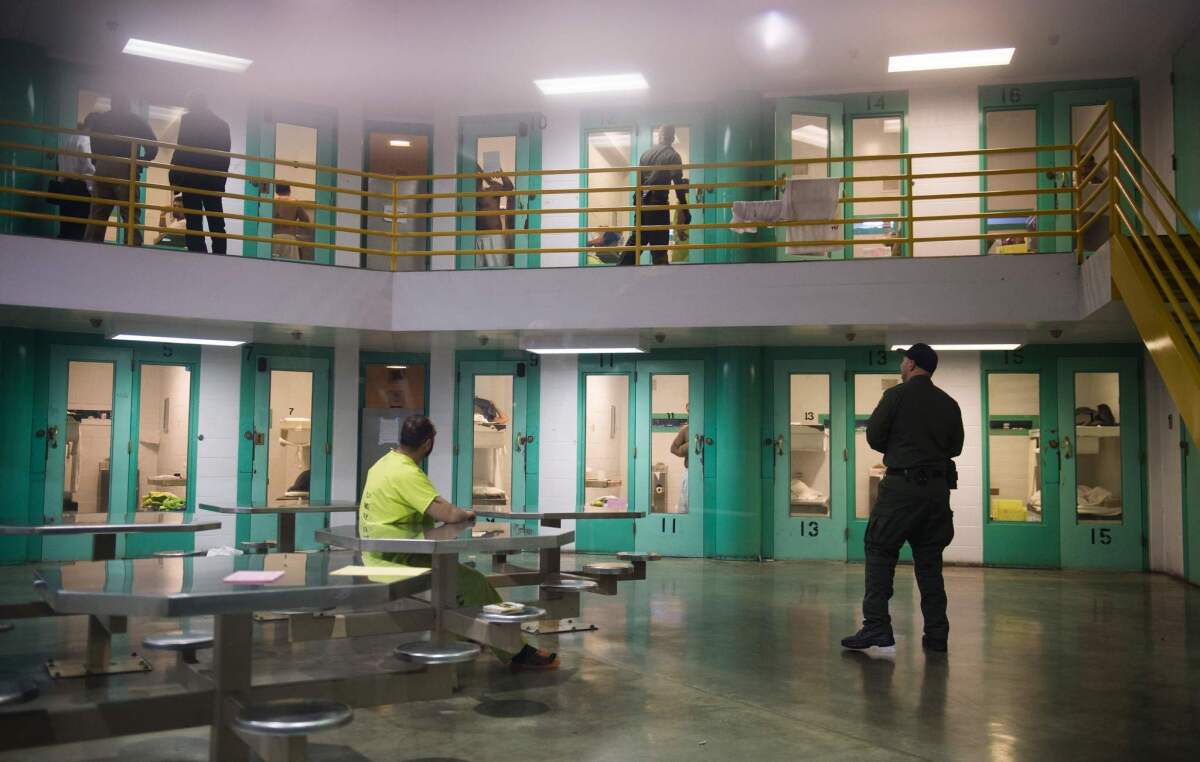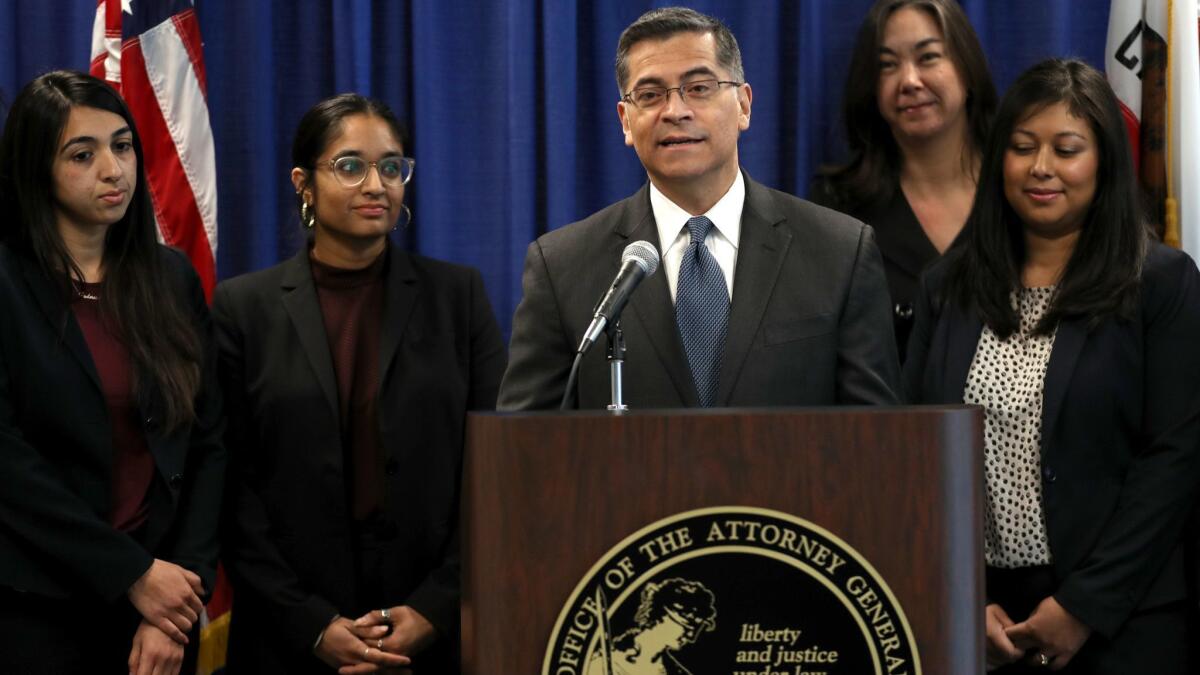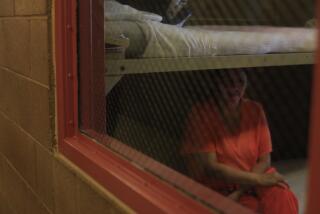California immigrant detainees face long periods of confinement and barriers to medical treatment, state audit reveals

Reporting from Sacramento — Lengthy stays in cells. A lack of access to doctors, counselors and legal aid. Few bilingual staffers who can explain rules or services. Limited opportunities to call or see friends and family.
On Tuesday, Atty. Gen. Xavier Becerra released findings from the first state inspection of California’s immigrant detention centers, designed to provide a deeper look into the conditions inside the system as the Trump administration takes a more aggressive approach to confining people who are in the country illegally. California is one of the first states to examine everyday operations at the facilities.
Over the last three years, more than 74,000 immigrant detainees from over 150 countries have been held at California’s 10 public and private detention centers, all inspected by the attorney general’s office. Immigrants spent more than 50 days confined on average, with one person staying in a facility for more than four years.
Conducted over the last year, the audit found conditions varied widely by center. But almost all facilities detained people in cells for long periods of time — sometimes up to 22 hours a day — without any breaks, according to the report. Immigrants faced significant language barriers and challenges in accessing medical and mental healthcare and legal counsel, state investigators found. Detainees were allowed only minimal contact with friends and family.
At a news conference Tuesday in San Francisco, Becerra emphasized that people confined inside the centers are civilian detainees who are awaiting determinations on their deportation status, not criminals.
“We hope that other states are watching because everyone in this country has constitutional rights and everyone at the end of the day — child and adult — deserves to be treated in a humane way,” Becerra said.
He said the failings at some facilities appeared to result from a ramp-up of immigration detention at the federal level that didn’t allow inspectors to properly vet procedures and conditions. Some detention centers have already begun taking steps to improve conditions based on the review, he added, saying it was “more a matter of knowing where they could do things differently.”
But the attorney general said that he is prepared to take legal action against those that fail to comply with his office’s recommendations.
Lori Haley, a spokeswoman with U.S. Immigration and Customs Enforcement, declined to answer questions about the audit, but said in a statement that the agency is committed to ensuring all detainees are treated humanely.
“The safety, rights and health of detainees in ICE’s care are of paramount concern and all ICE detention facilities are subject to stringent, regular inspections,” she said.
Lawyers with the attorney general’s office spent at least a day at each detention center, including multiple days at one youth facility in Yolo County, where federal officials have been criticized over disclosures indicating they improperly identified some children as gang members.
The in-depth look at the state’s detention system is the result of legislation passed in 2017, when lawmakers sought to increase oversight of those facilities and protections for immigrants amid Trump’s calls for increased deportations. Other state efforts from that year prevented detention centers from adding more beds, and pledged $1 million in spending to ensure proper access to food, medical care and lawyers.
The attorney general’s report coincides with a separate state audit released Tuesday that examined three private detention centers that hold detainees for cities and four counties that detain immigrants for ICE.
In that report, spanning fiscal years 2013 to 2017, inspectors found that counties failed to ensure ICE fully paid them, while cities used federal funds from ICE to pay subcontractors “without performing any meaningful oversight.”
“The state lacks complete information about how much it costs and what conditions the detainees face,” the report said. “Also unclear are how many detainees are being held throughout California, where they are being held, and for how long.”
Becerra’s inspection confirmed many of conditions reported by federal inspectors. Marisol León, a deputy state attorney general with the civil rights and enforcement division, called the stories of detainees, particularly of youth at the Yolo facility, “soul crushing.” Attorneys heard of women at other centers who did not receive proper medication, and a story of a baby ripped from a parent’s arms, she said.
They “hear that youth are coming, crossing multiple borders, fleeing violence, persecution and a lot of trauma and being retraumatized in many ways in the center,” she said.
In their report, state attorneys called attention to previous findings by federal inspectors last year on conditions at Adelanto, a facility in San Bernardino County that housed 10,000 detainees from June 2017 to October 2018. They detailed “nooses found in detainee cells, improper and overly restrictive segregation practices, and untimely and inadequate detainee medical care.”
The state attorney general’s report also noted the long history of issues with medical and mental health care at Otay Mesa Detention Center near the San Diego-Tijuana border. In recent years, several pregnant women there have said they weren’t given adequate care.
In Yolo County, which receives about $5.7 million annually from its detention contract and houses up to 24 juveniles in its facility at a time, inspectors from Becerra’s office met in August with 19 juveniles, all but one from Central American countries. The four-day inspection found that while staff was “well-intentioned,” minors were at times housed together with boys doing time for criminal charges in county juvenile detention, many in two-story dormitories in small cells with few outside windows.
Inspectors found force had been used against the detainees 27 times in the eight months prior to their visit and was a common “method of control.” In at least four instances reviewed on video, the use of force violated policies, with guards in one instance tackling a juvenile detainee while he sat at a table, the report said.
Nine of the detained juveniles told inspectors they had attempted to kill themselves or self-harmed while in the facility, and inspectors noted signs of cutting on some boys. One told investigators he tried to strangle himself with blankets. Another said, “I will stop trying to kill myself when I get out of here.”
Still, the center — one of only two high-security placements in the nation for immigrant youth in the custody of federal agencies — had inadequate mental health care available to detainees, “an extremely high level of psychiatric medication use in a detention facility” and failed to properly conduct suicide watches.
At the Yuba County Jail in Marysville, state investigators noted that women and men detained on ICE immigration holds were not separated from the general jail population, something cited last month when dozens of detainees there went on a six-day hunger strike to demand better conditions.
“It is not a good place to be,” said Carlos Montes-Ponce, a Sacramento immigration activist. “There is always tension because [the detainees] are mixed with the general population.”

For immigrant rights groups, some activists and lawyers said, the report has validated their work.
“The report confirms and reinforces what we have documented — that California immigrant jails and prisons are rife with abuse and have led to a toxic culture of impunity fueled by taxpayer money at the expense of thousands of lives,” said Liz Martinez of Freedom for Immigrants.
But she and others said it also fell short of expectations. Becerra said a lack of resources allowed a deeper review of only three facilities operated by local governments: Yolo County Juvenile Detention Facility, Theo Lacy Facility in Orange County and West County Detention Facility in Contra Costa County.
Some said more pressure should be placed on centers run by private prison companies, including the Adelanto Detention Facility, which is owned and operated by the GEO Group, a company that runs dozens of private prisons and detention centers around the country.
Others said the report also failed to demand full transparency because ICE and prison operators were informed of visits ahead of time.
“If we want to know what’s truly happening inside detention, we shouldn’t be giving them a pass by telling them when to be on their best behavior,” Martinez said. “The attorney general has the power to go in whenever he or his office wants. He should use that power.”
San Diego Union-Tribune reporter Kate Morrissey contributed to this report.
More stories from Jazmine Ulloa »
Twitter: @jazmineulloa
More to Read
Get the L.A. Times Politics newsletter
Deeply reported insights into legislation, politics and policy from Sacramento, Washington and beyond. In your inbox three times per week.
You may occasionally receive promotional content from the Los Angeles Times.













